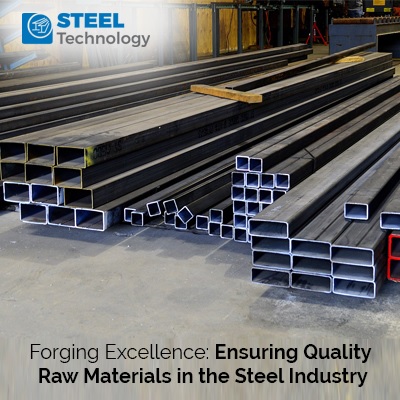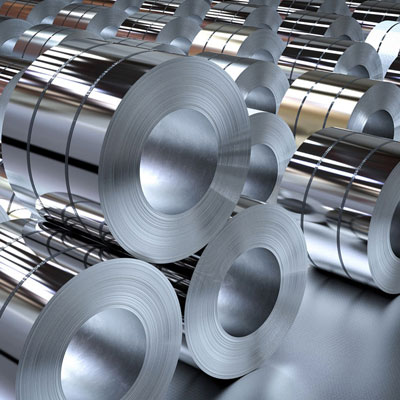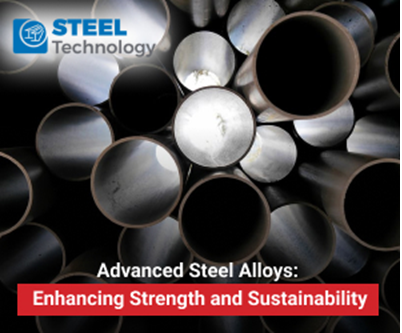Forging Excellence: Ensuring Quality Raw Materials in the Steel Industry

In the dynamic steel industry, quality raw materials are the foundation for excellence. Steel manufacturers understand that the strength, durability, and overall performance of their products heavily rely on the quality of the raw materials used in their production processes. Therefore, ensuring the highest standard of raw materials is not just a preference, but a necessity for forging excellence.
I. Importance of Quality Raw Materials in the Steel Industry
High-quality raw materials play a crucial role in the steel industry. The integrity and performance of steel products are directly influenced by the raw materials used in their production. From structural steel used in construction to automotive components and appliances, the quality of steel products relies on the quality of the raw materials.
Firstly, high-quality raw materials ensure the desired mechanical properties of the steel. The right combination of alloys and elements in the raw materials contributes to the strength, toughness, and corrosion resistance of the final steel products. This allows steel manufacturers to meet the stringent performance requirements of various industries. Secondly, quality raw materials minimize defects and inconsistencies in steel production. Impurities and variations in raw materials can lead to defects like porosity, inclusions, and uneven grain structure, compromising the integrity and reliability of steel products. By using high-quality raw materials, manufacturers can reduce the risk of defects and ensure consistent product quality.
Lastly, exceptional raw materials contribute to the longevity and durability of steel products. High-quality steel made from superior raw materials has enhanced resistance to wear, fatigue, and environmental factors. This ensures that steel products maintain their performance and structural integrity over extended periods, reducing maintenance costs and enhancing customer satisfaction.
II. Common Challenges in Sourcing Quality Raw Materials
Sourcing quality raw materials in the steel industry is not without its challenges. One of the primary challenges is the availability of consistent and reliable suppliers. Steel manufacturers often rely on a network of suppliers to provide raw materials, and ensuring a steady supply of high-quality materials can be a daunting task. Suppliers need to meet stringent quality standards and deliver materials in the required quantities and timelines.
Another challenge is the traceability and transparency of the raw materials supply chain. Steel manufacturers need to ensure that the raw materials they source are ethically and sustainably produced. This involves verifying the origin of the materials, ensuring compliance with environmental regulations, and promoting responsible sourcing practices. Traceability and transparency in the supply chain help build trust with customers and maintain a positive brand image.
Additionally, the cost of high-quality raw materials can be a significant challenge for steel manufacturers. Superior raw materials often come at a higher price, and balancing quality with cost-effectiveness is a constant consideration. Steel manufacturers need to carefully evaluate the cost-benefit ratio of using high-quality materials and explore strategies to optimize their procurement processes.
III. Types of Raw Materials Used in the Steel Industry
The steel industry relies on a variety of raw materials, each with its unique properties and applications. The most common raw materials used in steel production include iron ore, coal, limestone, and recycled steel.
Iron ore is the primary raw material used in steelmaking. It is a mineral mined from the earth and contains iron oxide, which is essential for the production of steel. Iron ore is often extracted through open-pit or underground mining, and its quality and composition determine the quality of the final steel products. Coal is another crucial raw material in steel production. It is used as a fuel and reducing agent in the blast furnace process, where iron ore is converted into molten iron. Coal provides the necessary carbon content and energy required to reduce iron ore to iron. Limestone, or calcium carbonate, is used as a fluxing agent in steelmaking. It helps remove impurities from the iron ore during the smelting process and acts as a binding agent for the slag generated during steel production.
Recycled steel, also known as scrap metal, is an increasingly important raw material in the steel industry. It involves the collection and processing of discarded steel products, such as cars, appliances, and construction materials. Recycling steel not only conserves natural resources but also reduces energy consumption and greenhouse gas emissions associated with steel production.
IV. Quality Control Measures in the Steel Industry
Maintaining quality control is essential throughout the steel production process to ensure the integrity and performance of the final steel products. Steel manufacturers employ various quality control measures to monitor and manage the quality of their raw materials.
One critical quality control measure is the implementation of rigorous testing and inspection procedures. Raw materials, such as iron ore and coal, undergo thorough testing to assess their chemical composition, moisture content, and other key parameters. This ensures that the materials meet the required specifications and are suitable for steelmaking. Another quality control measure is the implementation of advanced technology and automation in the production process. Steel manufacturers utilize cutting-edge equipment and monitoring systems to track and control various variables, such as temperature, pressure, and composition, during steelmaking. This helps minimize variations and defects, ensuring consistent product quality.
Additionally, steel manufacturers work closely with their suppliers to establish quality assurance programs. Regular audits and assessments are conducted to evaluate the suppliers' adherence to quality standards and their ability to consistently deliver high-quality materials. Collaboration with suppliers is crucial in maintaining a reliable and sustainable supply chain of quality raw materials.
V. Benefits of Using High-Quality Raw Materials in Steel Production
The use of high-quality raw materials in steel production offers numerous benefits to both manufacturers and end-users. These benefits extend beyond the immediate production process and have a significant impact on the performance, durability, and overall value of steel products.
Firstly, high-quality raw materials contribute to the production of steel products with superior mechanical properties. Steel made from high-quality raw materials exhibits enhanced strength, toughness, and resistance to fatigue. This allows steel products to withstand heavy loads, extreme conditions, and repeated stress, ensuring their longevity and reliability. Secondly, using high-quality raw materials results in steel products with improved dimensional accuracy. Consistent and reliable raw materials minimize variations and defects, ensuring that the final products meet the desired specifications and tolerances. This is particularly important in industries where precision and reliability are critical, such as automotive and aerospace.
Furthermore, the use of high-quality raw materials enhances the corrosion resistance of steel products. Steel made from superior raw materials exhibits improved resistance to rust, oxidation, and other forms of corrosion. This extends the lifespan of steel products, reduces maintenance costs, and enhances their aesthetic appeal.
Lastly, the use of high-quality raw materials promotes sustainability and environmental responsibility. Superior raw materials often come from ethical and sustainable sources, reducing the environmental impact associated with steel production. Additionally, the durability and longevity of steel products made from high-quality materials contribute to a more sustainable and circular economy.
VI. Strategies for Ensuring Quality Raw Materials in the Steel Industry
Ensuring the procurement of quality raw materials requires the implementation of effective strategies and best practices. Steel manufacturers can adopt the following strategies to enhance their raw material quality assurance processes:
Establishing strict supplier qualification criteria: Steel manufacturers should thoroughly evaluate potential suppliers based on their track record, certifications, and adherence to quality standards. Only suppliers that meet the stringent criteria should be considered for partnerships.
Implementing regular supplier audits and inspections: Conducting periodic audits and inspections of suppliers' facilities and processes helps ensure compliance with quality standards. This includes evaluating their quality control measures, environmental practices, and ethical sourcing efforts.
Investing in in-house testing and quality control capabilities: Steel manufacturers can develop in-house testing laboratories and quality control departments to verify the quality of raw materials received from suppliers. This allows for more immediate and thorough quality assessments.
Promoting collaboration and knowledge-sharing: By fostering collaboration with suppliers, industry associations, and research institutions, steel manufacturers can stay updated on the latest advancements in raw material quality control. This knowledge-sharing can help identify new techniques and best practices for ensuring quality raw materials.
Continuous improvement and innovation: Steel manufacturers should continuously evaluate and enhance their raw material quality assurance processes. This involves investing in new technologies, exploring alternative raw material sources, and adopting innovative testing and inspection methods.
VII. The Role of Certifications in Verifying Raw Material Quality
Certifications play a crucial role in verifying the quality of raw materials in the steel industry. They provide independent validation of a supplier's adherence to specific quality standards and industry best practices. Certifications assure steel manufacturers that the raw materials they procure meet the necessary specifications.
One widely recognized certification in the steel industry is the ISO 9001:2015. This certification ensures that a supplier has implemented a quality management system and maintains consistent quality control practices. Steel manufacturers often prioritize suppliers with ISO 9001:2015 certification as it demonstrates their commitment to delivering high-quality raw materials.
Additionally, certifications related to environmental management, such as ISO 14001, can ensure that the raw materials are sourced sustainably and in compliance with environmental regulations. These certifications validate the supplier's efforts to minimize the environmental impact of their operations, promoting responsible sourcing practices.
Furthermore, certifications related to specific raw materials, such as the Responsible Steel Certification, assure ethical sourcing and responsible production practices. These certifications consider factors like human rights, labor practices, and community welfare, ensuring that the raw materials are produced in a socially responsible manner.
Steel manufacturers should prioritize suppliers with relevant certifications, as they provide an additional layer of confidence in the quality and sustainability of the raw materials.
VIII. Collaborations and Partnerships for Sourcing Quality Raw Materials
Collaborations and partnerships play a vital role in ensuring the sourcing of quality raw materials in the steel industry. Steel manufacturers can collaborate with various stakeholders to enhance their raw material quality assurance processes.
One key collaboration is with the suppliers themselves. By establishing long-term partnerships with reliable and quality-focused suppliers, steel manufacturers can ensure a steady supply of high-quality raw materials. These partnerships should be built on mutual trust, open communication, and a shared commitment to quality. Collaboration with industry associations and research institutions can also be beneficial. These organizations often provide valuable insights into raw material quality control practices, emerging trends, and technological advancements. Steel manufacturers can actively participate in industry forums and conferences to exchange knowledge and build relationships with experts in the field.
Furthermore, collaborations with customers can drive the demand for high-quality raw materials. Steel manufacturers should engage with their customers to understand their specific requirements and ensure that the raw materials used in production meet their expectations. This collaboration helps align the quality standards of the raw materials with the end-user needs, enhancing customer satisfaction and loyalty.
Additionally, collaborations with recycling facilities and scrap metal collectors can support the sourcing of recycled steel as a raw material. By partnering with these organizations, steel manufacturers can secure a consistent supply of high-quality recycled steel and contribute to the circular economy.
Conclusion: The Future of Quality Raw Materials in the Steel Industry
In conclusion, the steel industry recognizes the paramount importance of quality raw materials in achieving excellence. High-quality raw materials not only contribute to the mechanical properties and durability of steel products but also promote sustainability and environmental responsibility.
Steel manufacturers face challenges in sourcing quality raw materials and ensuring their consistency. However, by implementing effective strategies, collaborating with stakeholders, and prioritizing certifications, steel manufacturers can enhance their raw material quality assurance processes. The future of quality raw materials in the steel industry lies in continuous improvement, innovation, and collaboration. Steel manufacturers must stay updated on advancements in raw material quality control, explore alternative sources, and foster partnerships to ensure a reliable and sustainable supply of high-quality raw materials.
By forging excellence through quality raw materials, the steel industry can continue to meet the evolving needs of various sectors and contribute to a more sustainable and resilient future.











